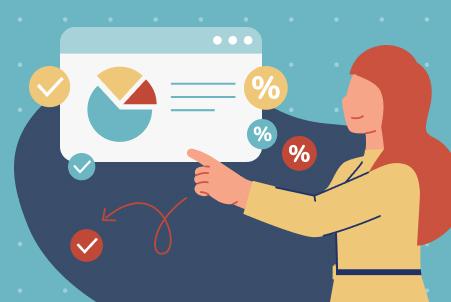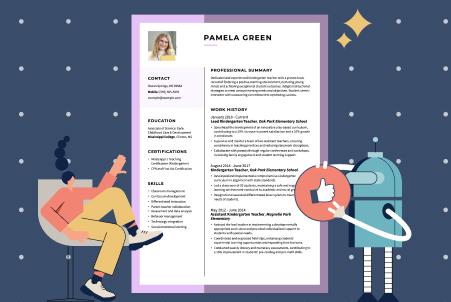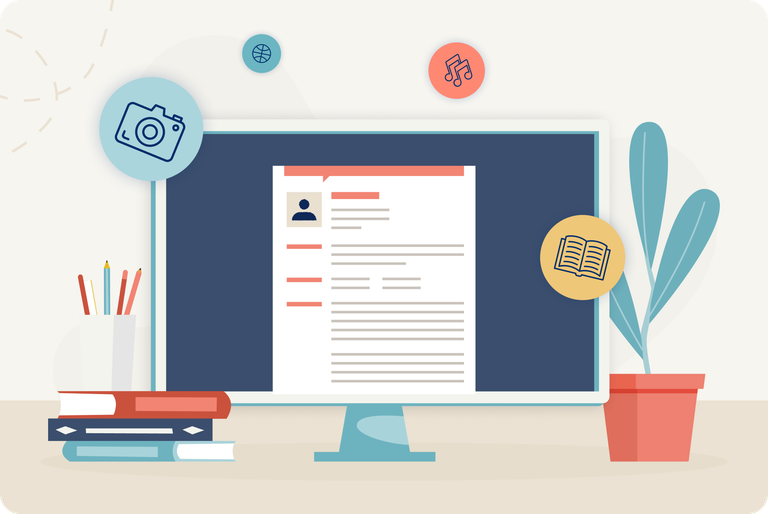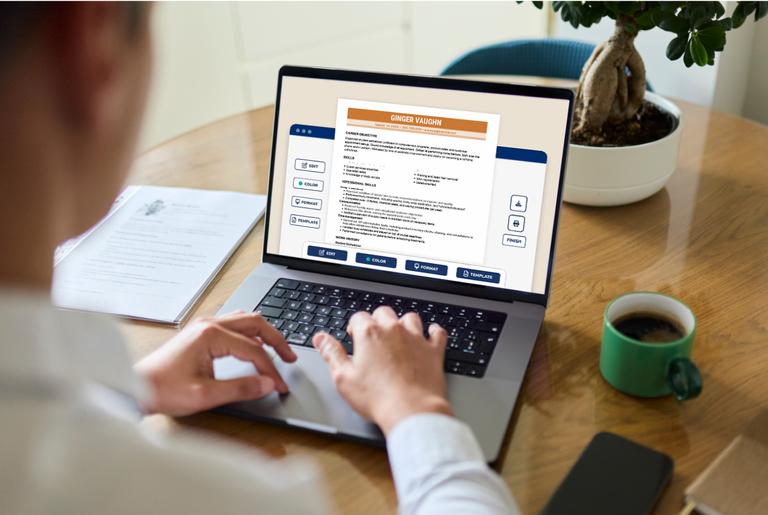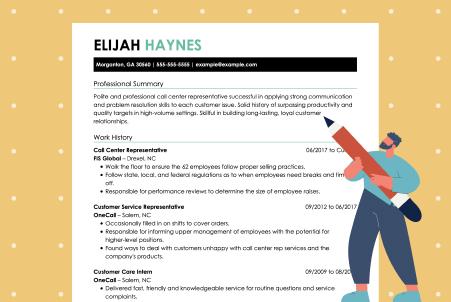Critical Thinking Skills: Examples for Your Resume

Our customers have been hired at: *Foot Note
AI Resume Skills Generator

Critical thinking is a fundamental skill that helps us analyze, evaluate and interpret information clearly and effectively. It involves actively questioning and challenging concepts, thoughts, ideas and actions to make reasoned decisions. In this guide, we provide examples of key critical thinking skills for your professionally resume written and practical strategies for mastering and using them in the workplace.
Make a resume with MyPerfectResume
Our Resume builder can help you write the perfect resume. Start Now!
What are critical thinking skills?
Critical thinking skills include a wide range of cognitive abilities that help us learn and process information, assess situations, and understand complex ideas to make sound and informed decisions. Potential employers look for candidates with strong critical thinking skills because they are typically adept at navigating various challenges, solving problems and analyzing data, helping companies grow and thrive in today’s dynamic marketplace. Browse our library of resume examples to see how to add critical thinking skills to your resume.
Top critical thinking skills for work
Critical thinking skills are critical in the workplace because they foster innovation, collaboration and productivity.
Some of the top critical thinking skills for work include:
- Analytical thinking: Analytical thinkers excel at scrutinizing data, assessing relationships and drawing logical conclusions. Analyzing information and breaking complex problems into manageable pieces are essential for making well-informed decisions on the job.
- Creative thinking: Creativity involves formulating original ideas, thinking outside the box, and approaching challenges from unconventional angles. Creative thinkers contribute unique perspectives to drive innovation within their organizations.
- Problem-solving: Effective problem solvers identify issues, evaluate possible solutions, and implement strategies to address them. If you are proficient at solving problems, you bring resourcefulness, resilience, and the ability to find solutions confidently to the workplace.
- Decision-making: Strong decision-makers consider options, weigh sides, look for alternatives, and choose the best course of action based on available information and desired outcomes. In the workplace, decision-making is crucial for making pragmatic decisions quickly.
- Strategic thinking: Strategic thinkers can anticipate trends, assess risks, and develop long-term plans aligned with organizational goals. If you are adept at strategic thinking, you can see the big picture and the broader context for making decisions.
- Logical reasoning: Logical reasoning involves evaluating arguments, recognizing patterns, identifying flaws and drawing conclusions based on evidence. If you excel at logical reasoning, you can help enhance processes and drive growth in the workplace.
- Attention to detail: A sharp eye for detail is essential for ensuring work accuracy, precision, and quality. By paying close attention to details at work, you can spot errors, find inconsistencies, and maintain high standards of excellence.
- Open-mindedness: Being open-minded at work enhances adaptability, promotes inclusivity, and encourages innovation. It means being receptive to new ideas, diverse perspectives and constructive feedback.
- Communication skills: Effective communication skills are essential for sharing information, understanding, expressing ideas and collaborating. Being a good communicator at work can enhance productivity, facilitate teamwork and achieve consensus.
- Curiosity: When you are curious, you are driven to learn new things, ask questions and understand different perspectives and viewpoints. In the workplace, curiosity helps you continuously expand and deepen your knowledge and expertise in your field.
Tip: Use a resume template to easily and quickly add your critical thinking skills to your resume.
Examples of critical thinking skills in the workplace
Using critical thinking skills in the workplace involves employing logical reasoning, data analysis and rational judgment to make well-informed decisions.
Here are some examples of how you might apply critical thinking skills in various workplace scenarios:
Risk management
Workplace scenario: A project team identifies potential risks that could impact the successful completion of a project.
Application: Conduct a risk assessment, identify potential threats or uncertainties, develop contingency plans, and implement proactive measures to mitigate risks and minimize negative impacts.
Critical evaluation
Workplace scenario: A human resources manager is reviewing job applications to shortlist candidates for interviews.
Application: Scrutinize resumes, cover letters, and portfolios, assess candidates' qualifications, experience, and fit for the role, and make objective judgments to select the most suitable candidates.
Adaptability
Workplace scenario: A sales representative must adjust their approach when dealing with a difficult client.
Application: Assess the client's needs and preferences, remain flexible in communication style and negotiation tactics, and adapt strategies in real-time to build rapport and address concerns effectively.
Logical reasoning
Workplace scenario: A financial analyst reviews investment proposals to recommend the most viable option.
Application: Analyze financial data, evaluate assumptions and projections, identify logical inconsistencies or risks, and make recommendations based on reasoned analysis.
Strategic thinking
Workplace scenario: A business leader is developing a long-term growth strategy for the company.
Application: Assess market trends, competitive landscape, and organizational capabilities, set clear objectives, formulate strategic initiatives, and allocate resources effectively to achieve long-term goals.
Analytical thinking
Workplace scenario: A marketing manager must analyze market trends to develop a new advertising campaign.
Application: Use data analysis tools to examine sales data, consumer behavior, and competitor strategies to identify opportunities and inform campaign decisions.
Critical thinking skills for leaders
Leaders need critical thinking skills to make efficient decisions, plan strategically, and solve problems effectively. Critical thinking skills can help you analyze information, evaluate complex situations, and make informed choices. Thinking critically helps leaders avoid common pitfalls such as cognitive biases and emotional reactions, which can cloud judgment and lead to poor decision-making.
Leaders who demonstrate strong critical thinking skills serve as role models, inspiring their teams to develop and hone these skills themselves. This creates a ripple effect, leading to a more analytical, innovative, and resilient organization. Leaders who foster a culture of critical thinking within their teams encourage a more collaborative and productive work environment where ideas are rigorously evaluated and improved upon.
Here are our top ten critical thinking skills for leaders:
- Analytical thinking: The ability to break down complex information into smaller, manageable parts to understand it better.
- Problem-solving: Allows those in leadership positions to identify issues, develop potential solutions and implement the most effective one.
- Decision-making: Helps leaders make informed and well-considered choices by evaluating all available information and alternatives.
- Strategic thinking: Critical for leaders to plan for the future by considering long-term goals and potential outcomes.
- Creative thinking: Necessary for thinking outside the box and generating innovative solutions to problems.
- Communication: Enables leaders to articulate ideas, reasoning, and decisions to others, fostering understanding and collaboration.
- Emotional intelligence: Vital for leaders to recognize and manage their own and others' emotions so they can make balanced decisions.
- Self-reflection: Allows leaders to critically evaluate their own performance and thought processes for continuous improvement and growth.
- Open-mindedness: Necessary for considering new ideas, perspectives and approaches objectively.
- Resilience: Helps leaders remain focused and composed under pressure, adapting to challenges and setbacks effectively.
Improve your critical thinking skills
Honing your critical thinking skills can enhance your analytical abilities and cognitive agility to navigate challenges confidently.
Here are our tips for enhancing your critical thinking skills:
Embrace a growth mindset and seek opportunities for intellectual engagement.
Engage in discussions and debates with peers to learn from different perspectives and challenge your assumptions.
Read various subjects to broaden and deepen your knowledge and explore different ways of thinking.
Practice problem-solving exercises, puzzles, or brainteasers that require analytical thinking and creative problem-solving.
Welcome ambiguity for growth, and approach challenges with confidence and curiosity.
Explore local or virtual workshops, seminars, or conferences on critical thinking. These events often feature interactive sessions, practical exercises and opportunities for networking with professionals who share similar interests.
Join online forums, discussion groups, or book clubs dedicated to critical thinking topics. Engaging in discussions with like-minded individuals can provide valuable insights, perspectives, and opportunities for collaborative learning.
Find opportunities to participate in problem-solving exercises or case studies to develop your analytical and problem-solving skills in real-world contexts.
Look for reputable online platforms that offer courses specifically focused on critical thinking skills. Websites like Coursera, edX, or LinkedIn Learning often have courses taught by experts that cover various aspects of critical thinking.
Resources for developing critical thinking skills:
There are numerous resources available to help you cultivate and enhance your critical thinking skills, including:
Books
Books, especially those on philosophy, logic and critical thinking, provide in-depth knowledge and various perspectives, helping to sharpen analytical and evaluative skills. Reading diverse authors and genres exposes you to different ways of thinking and reasoning. They also help you develop the ability to analyze arguments and evidence systematically. Consistently reading challenging material can enhance your ability to comprehend complex ideas and think critically about them.
Online courses
Online courses on critical thinking, logic, and problem-solving offer structured learning with interactive components. These courses often include practical exercises, quizzes and peer discussions, which help reinforce critical thinking concepts. They provide flexibility, allowing you to learn quickly and revisit challenging topics. Additionally, many online courses are taught by experts, providing access to high-quality education and insights.
Websites and blogs
Websites and blogs dedicated to critical thinking, reasoning and skepticism offer ongoing, accessible content that can be integrated into daily life. They provide current examples and discussions on applying critical thinking in various contexts. Regularly engaging with this content helps keep your critical thinking skills sharp and up-to-date. Furthermore, they often encourage readers to comment and discuss, fostering a community of critical thinkers.
Podcasts
Podcasts on critical thinking, science, and reasoning provide an auditory learning experience that can be consumed during commuting or other activities. They often feature interviews with experts, case studies and practical tips, making complex ideas more relatable and easier to understand. Listening to diverse viewpoints and analyses can enhance your ability to think critically about various issues.
Workshops and seminars
Workshops and seminars offer hands-on, interactive learning experiences that can deepen your understanding of critical thinking concepts. These events typically include activities, discussions and real-time feedback, allowing you to practice and refine your skills. They provide opportunities to network with other critical thinkers, fostering collaboration and the exchange of ideas. Attending these events can also keep you motivated and engaged in your ongoing development.
Key takeaways
Let's review what you’ve learned about critical thinking skills from this guide:
- Critical thinking skills include a wide range of abilities, including analytical skills, problem-solving, and decision-making.
- Embracing a growth mindset and seeking new knowledge are great tactics for improving your critical thinking skills.
- Using critical thinking skills in the workplace involves employing logical reasoning, data analysis and rational judgment.
FAQ
What are critical thinking skills?
Critical thinking skills are the abilities that enable individuals to analyze, evaluate, and synthesize information effectively. These skills include analytical thinking, where one breaks down complex information; problem-solving, which involves identifying and resolving issues; and decision-making, which entails making well-informed choices.
Other critical thinking skills are strategic thinking, allowing for long-term planning, goal alignment, and creative thinking, which encourages innovation. Critical thinking involves strong communication skills to articulate reasoning, emotional intelligence to manage emotions and understand others, and self-reflection to improve thought processes continuously.
Why are critical thinking skills important?
What are some examples of critical thinking skills?
Critical thinking skills include analytical thinking, problem-solving, decision making, logical reasoning, creative thinking and strategic planning.
How can I develop my critical thinking skills?
Developing your critical thinking skills involves a combination of practice, reflection and active learning. Start by engaging in activities challenging your reasoning abilities, such as puzzles, debates and reading diverse materials. Practice questioning assumptions and evaluating evidence critically in everyday situations. Reflect regularly on your thought processes and decisions, identifying areas for improvement. Seek feedback from others to gain different perspectives and refine your thinking.
It also helps to cultivate a mindset of curiosity and openness to new ideas, as this will help you explore various viewpoints and approaches. Continuous learning, whether through formal education or self-directed study, will also enhance your analytical and problem-solving skills over time.
How do critical thinking skills contribute to workplace success?
Critical thinking skills contribute significantly to workplace success by enhancing decision-making, problem-solving and innovation. Employees with strong critical thinking abilities can analyze complex issues, identify the root causes of problems and develop effective solutions, improving efficiency and productivity.
These skills also enable individuals to make informed, evidence-based decisions, reducing the risk of errors and enhancing the quality of outcomes. Additionally, critical thinkers can evaluate the potential impacts of their actions and adapt strategies as needed, ensuring alignment with organizational goals. This adaptability and foresight foster a proactive and resilient work environment, driving continuous improvement and long-term success.
How can I assess my critical thinking skills?
What are the top critical thinking skills?
The top critical thinking skills include analytical thinking, problem-solving, decision-making, strategic thinking and creative thinking.
- Analytical thinking allows individuals to break down complex information into manageable parts for better understanding.
- Problem-solving involves identifying the root causes of issues and developing effective solutions.
- Decision-making is making informed and balanced choices by evaluating all available information and alternatives.
- Strategic thinking involves planning with a long-term perspective and aligning actions with overarching goals.
- Creative thinking encourages innovative approaches to problems, leading to unique and effective solutions.
What makes a person a critical thinker?
A person is considered a critical thinker if they consistently exhibit open-mindedness, curiosity, skepticism, and a willingness to question assumptions. Critical thinkers are adept at analyzing information objectively and can identify biases and logical fallacies. They can evaluate evidence, weigh the validity of different arguments, and make reasoned conclusions.
Critical thinkers are reflective, meaning they regularly assess their own thought processes and adjust them as needed. Their ability to communicate their reasoning effectively also plays a crucial role in their critical thinking capabilities.
What are the 5 Cs of critical thinking?
The 5 Cs of critical thinking are clarity, consistency, creativity, curiosity and collaboration.
- Clarity involves ensuring that ideas and arguments are expressed clearly and understandably.
- Consistency refers to maintaining logical coherence and uniformity in one’s reasoning.
- Creativity is the ability to think outside the box and generate innovative solutions.
- Curiosity drives a desire to explore, ask questions, and seek deeper understanding.
- Collaboration emphasizes working with others to refine ideas, challenge perspectives, and achieve well-rounded conclusions. These elements together foster a robust critical thinking process.
Our customers have been hired at:*Foot Note
